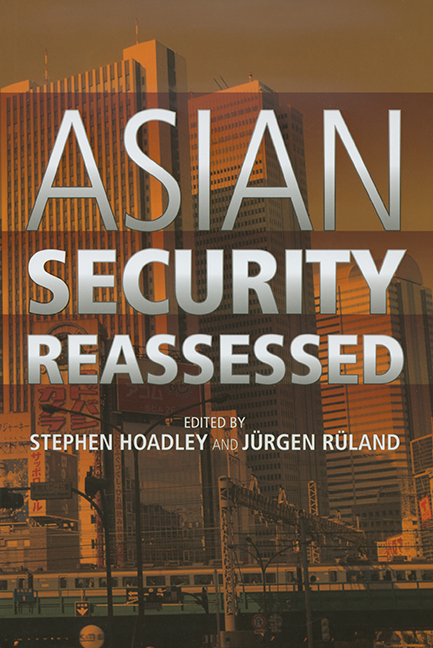Book contents
- Frontmatter
- Contents
- Acknowledgements
- About the Contributors
- List of Abbreviations
- Preface
- Part One Approaches to Asian Security
- Part Two Security Management by Asian States and Regional Institutions
- 2 Asia from Colonialism to Culturalism
- 3 Japan and East Asian Regional Security
- 4 China's Security Strategy and Policies
- 5 United States Security Policies in Asia
- 6 Regional Security Institutions: ASEAN, ARF, SCO and KEDO
- Part Three Non-Traditional Challenges to Asian Security
- Part Four New Concepts of Asian Security
- Index
2 - Asia from Colonialism to Culturalism
from Part Two - Security Management by Asian States and Regional Institutions
Published online by Cambridge University Press: 21 October 2015
- Frontmatter
- Contents
- Acknowledgements
- About the Contributors
- List of Abbreviations
- Preface
- Part One Approaches to Asian Security
- Part Two Security Management by Asian States and Regional Institutions
- 2 Asia from Colonialism to Culturalism
- 3 Japan and East Asian Regional Security
- 4 China's Security Strategy and Policies
- 5 United States Security Policies in Asia
- 6 Regional Security Institutions: ASEAN, ARF, SCO and KEDO
- Part Three Non-Traditional Challenges to Asian Security
- Part Four New Concepts of Asian Security
- Index
Summary
INTRODUCTION
This chapter builds on the observation that the past leaves a legacy, and that that legacy will influence contemporary security perceptions and security policies. This theme is always implicit, and often explicit, in the chapters that follow, for which this chapter serves as a historical introduction. However, the course of history is neither a progressive one as Westerners tend to believe, nor a cyclic one, as Asians under the influence of Buddhism tend to believe. It is rather a winding road, and those travelling it have difficulty detecting the turning points or most important milestones. Sometimes the past seems totally forgotten, no longer affecting politics. But with sudden changes in international affairs the national past can reemerge into view, be freshly interpreted, and even be deliberately molded to support a particular response to a security crisis. History, as constructivists warn us, is not a monolith but rather a quarry where the stones are chosen and shaped by policymakers for a political purpose.
An example will illustrate the point and also lead the discussion to the body of this chapter. In the eyes of United States policymakers, the Pacific countries have been an American sphere of influence, a U.S. security and economic “mare nostrum”, for almost 150 years. This outlook was challenged by the great European powers in the age of imperialism and was contested again by Asian leaders in the post-colonial era. Because of their Asian colonial heritage, British, French and Dutch historians often tend to glorify the colonial past, which in turn legitimated their governments’ later searches for privileges in the region. Contrariwise, Asian leaders find little virtue in the colonial past but reached back to pre-colonial kingdoms and cultures to underpin their authoritarian and nationalistic policies.
THREE SCHOOLS OF SECURITY THINKING
Considering these varying national perceptions, contemporary historians and political scientists have developed three schools of thinking about security that are applicable to East Asia. These have been foreshadowed also by the discussion in Chapter 1 of this book. The school of realism focuses on power-politics, a derivative of Bismarck's “realpolitik”, to achieve security. European statesmen and historians, quite familiar with the continental record of permanent wars, have developed the idea of challenge and response or, in military terms, of attack and counter-attack, and also of threat and deterrence.
- Type
- Chapter
- Information
- Asian Security Reassessed , pp. 37 - 65Publisher: ISEAS–Yusof Ishak InstitutePrint publication year: 2006



